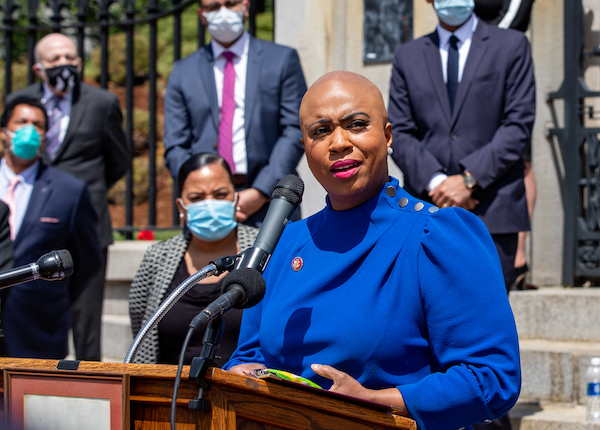latest
Congresswoman Pressley, survivors highlight trauma response with eye on “next pandemic”

By Sam Drysdale
BOSTON, FEB. 21, 2023…..The next pandemic with which the U.S. will have to contend is widespread and untreated trauma, Congresswoman Ayanna Pressley said Tuesday.
Pressley met with Boston Marathon bombing survivors at a community health center in Dorchester to discuss the Post Disaster Mental Health Response Act, which Pressley and other lawmakers filed in 2021 after conversations with marathon bombing survivors. President Joe Biden signed the legislation into law in December.
The new law expands federal mental health support for survivors of natural disasters, domestic terrorist attacks and other crises that are declared designated emergencies by FEMA, according to Pressley. Before the law, short-term mental health resources for survivors through FEMA were only available following “major disaster declarations,” like COVID-19, but not “emergency declarations” for “smaller” disasters, like the Boston bombing.
Pressley said that there have been 4,000 emergency declarations around the U.S. in the last decade, for which survivors did not get access to FEMA’s federal resources for trauma recovery.
“Trauma is nonlinear and it’s discriminatory, and our federal response should meet every impacted individual exactly where they are,” Pressley said. “This measure will confront what I deem to be the next pandemic, and that’s trauma.”
Marathon bombing survivor Manya Chylinski called Pressley’s office after connecting with fellow survivors and hearing that they all had struggled to find mental health care after the traumatic event.
“I just felt like I kept knocking on doors, kept saying, ‘Can you help me? This thing happened to me, can you help me?'” Chylinski said on Tuesday. “It felt like if I was going to get help, I had to figure it out myself.”
FEMA’s counseling assistance program, which is now available for survivors of emergency declarations, provides emergency mental health care within the first nine months of the event.
“We know that the earlier you help people, the better chance they have at recovery, and that might mean helping people enough that they don’t then need formal mental health treatment,” Chylinski said.
Lynn Julian, another Boston bombing survivor who suffered brain damage, permanent hearing loss, and severe neck, back and shoulder injuries, said her complex PTSD might have been avoided if she had gotten the therapy she needed more quickly.
It took seven months after the April 2013 attack for Julian to access group therapy, at which point her PTSD evolved to become “complex,” she said.
She was afraid to leave her building and to get into a taxi alone with a male driver, she said. When Julian went to the emergency room for what was later diagnosed as PTSD and a brain injury, doctors offered to have her see a priest, then sent her home with discharge papers with just the word “anxiety” on them, she said Tuesday.
Julian said the Massachusetts Resiliency Center — which provided free services for victims of the marathon bombings, operated by the state’s Office of Victim Assistance — turned her away. She said center staff told her they were not accepting survivors with “internal” or “invisible” injuries.
“Our trauma was fresh, and we needed help,” Julian said.
In addition to providing federal resources to connect survivors of domestic terrorism with treatment, Pressley said the law will also help provide resources for those who survive natural disasters that are declared as emergencies. That feature, she said, will become more important as climate change fuels an increase in extreme weather events.
Samantha Paladini of nonprofit Communities Responding to Extreme Weather, said a case study on Hurricane Katrina survivors found 54 percent said they developed anxiety and mood disorders, 54 percent of adults and 45 percent of children developed depression, and one in six people developed PTSD.
“Recognizing the interconnection between natural disasters and mental health in this bill is a big step forward for the climate action movement,” she said.
State Sen. Liz Miranda of Boston and Boston City Councilor Julia Mejía joined Pressley at the event.
“We know that 40 percent of Americans, likely even a higher percentage in my district, would struggle to produce $400 in an emergency. How we respond to crisis and trauma directly influences an individual’s ability to recover, heal, and meaningfully continue a healthy life, and the Post-Disaster Mental Health Response Act provides critical flexibility in the law to ensure families and communities have immediate and life-saving resources in times of crisis,” Miranda said in a statement. “In Boston, in one of our worst moments when terrorism was in our community, government failed to meet the magnitude of the moment with resources and infrastructure to respond — this legislation will ensure we are prepared in times of crisis.”
Pressley introduced the legislation alongside Reps. Dina Titus of Nevada, David McKinely of West Virginia, Peter Meijer of Michigan and Sens. Dick Durbin of Illinois and Rob Portman of Ohio.





What about us
February 22, 2023 at 7:56 am
How about therapy for the common sense people who love in MA and have to deal with your ridiculous policies.